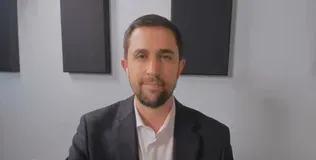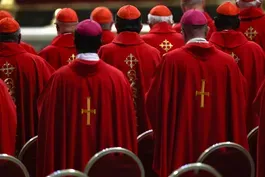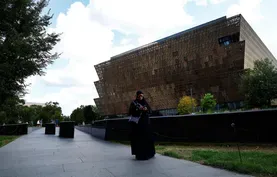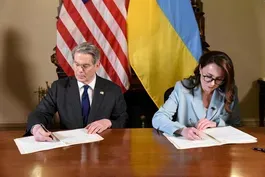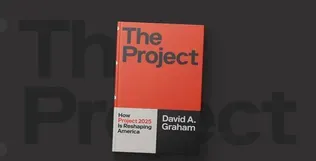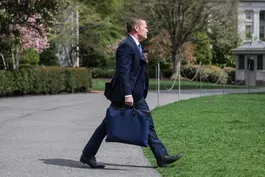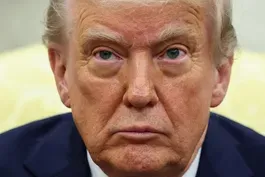
Ex-ambassador on changes to Trump's national security team
Clip: 5/1/2025 | 6m 11sVideo has Closed Captions
Former ambassador John Negroponte discusses changes to Trump's national security team
The Trump White House announced a major shakeup with embattled National Security Adviser Mike Waltz leaving his post to become the next U.S. ambassador to the U.N. Amna Nawaz discussed the move with Ambassador John Negroponte. He was the first director of national intelligence during the George W. Bush administration.
Problems with Closed Captions? Closed Captioning Feedback
Problems with Closed Captions? Closed Captioning Feedback
Major corporate funding for the PBS News Hour is provided by BDO, BNSF, Consumer Cellular, American Cruise Lines, and Raymond James. Funding for the PBS NewsHour Weekend is provided by...

Ex-ambassador on changes to Trump's national security team
Clip: 5/1/2025 | 6m 11sVideo has Closed Captions
The Trump White House announced a major shakeup with embattled National Security Adviser Mike Waltz leaving his post to become the next U.S. ambassador to the U.N. Amna Nawaz discussed the move with Ambassador John Negroponte. He was the first director of national intelligence during the George W. Bush administration.
Problems with Closed Captions? Closed Captioning Feedback
How to Watch PBS News Hour
PBS News Hour is available to stream on pbs.org and the free PBS App, available on iPhone, Apple TV, Android TV, Android smartphones, Amazon Fire TV, Amazon Fire Tablet, Roku, Samsung Smart TV, and Vizio.
Providing Support for PBS.org
Learn Moreabout PBS online sponsorshipAMNA NAWAZ: In the meantime here, following this breaking news, I'm joined in studio by Ambassador John Negroponte.
During the George W. Bush administration,he served as U.S. envoy to the United Nations, to Iraq, and then as the first director of national intelligence.
He's now vice chairman of McLarty Associates.
That's an international consulting company.
Ambassador, welcome back to the "News Hour."
JOHN NEGROPONTE, Former U.S. Director of National Intelligence: Thank you.
AMNA NAWAZ: Good to see you here.
Let's just begin with your reaction to this shakeup.
Does any of this surprise you?
JOHN NEGROPONTE: You know, honestly, with President Trump, no, I don't think so.
We went through it in his first administration.
And so I kind of expected something like this to happen some time.
In what particular form, I didn't know.
AMNA NAWAZ: Well, to move Mike Waltz from national security adviser to U.N. ambassador, help us understand the layout here.
Do we see that as a demotion?
Is it an ouster?
How do you view it?
JOHN NEGROPONTE: Yes, I mean, I think it's -- even though it's a very interesting and very important job -- I enjoyed doing it myself a great deal.
And there have been some notable people occupying that position, including Adlai Stevenson and Henry Cabot Lodge and all.
I think, in this context, it's a bit of a consolation prize.
AMNA NAWAZ: And why do you think -- I mean, after the Signalgate controversy, did it feel to you like there had to be some kind of accountability within the White House?
Were Mike Waltz's days numbered, in other words?
JOHN NEGROPONTE: I didn't know for sure, but I did pick up from some others that I knew who worked in or near the National Security Council that there was still quite a bit of turmoil and nervousness about Mr. Waltz's standing with the president.
So it was in the air, if you want.
AMNA NAWAZ: And I guess the related question is, if he's now going to be moved to U.N. ambassador, he does face a confirmation hearing, we assume.
AMNA NAWAZ: Does that mean he could now also face the slew of questions about Signalgate and other administration decisions in those hearings?
JOHN NEGROPONTE: Well, I don't know.
I mean, that will depend.
He's going to make a round of consultations with the various senators, explain the situation and so forth, and hopefully that will be kept to a minimum.
I can't imagine that Mike Waltz's confirmation would end up being a problem with the United States Senate.
AMNA NAWAZ: So let me ask you about secretary of state then, Marco Rubio.
He's stepping in as the interim national security adviser.
He now has two huge portfolios.
As you know, the national security adviser staff, they're all supposed to coordinate and hash out policies among a number of different agencies, State and Defense and Treasury and so on.
Can Rubio do that, holding both jobs?
How do you see that unfolding?
JOHN NEGROPONTE: Well, I think he will do it with some difficulty and probably pretty long hours in each of his days.
But I don't expect that to be the situation for a prolonged period of time.
They're going to have to find a new NSC adviser sooner, rather than later.
And let me remind you, because some people act as if this might be some kind of surprising development, Ronald Reagan, whom history at the moment views quite favorably, had six, count them, six national security advisers during his eight years in office.
So there have been past instances of frequent changes in national security advisers.
AMNA NAWAZ: As you implied earlier, though, this is a president who, especially in his first term, was known for some of the chaos in his own team.
I mean, the fact, as Nick reported, that the State Department spokesperson did not know her boss was taking over as the interim national security adviser... AMNA NAWAZ: ... does that reveal anything to you about how this White House works?
JOHN NEGROPONTE: Well, yes, it's Mr. Trump is a fairly spontaneous gentleman and he does things on the spur of the moment.
But, by the way, the National Security Council that Nick at the top of the show described is the way it's supposed to be that on paper.
JOHN NEGROPONTE: And, by and large, over its past 70 years of existence, it's worked that way.
But I would say Mr. Trump's presidency might turn out to be a bit of an exception, in that I don't think he's going to follow in quite the same way the rigid discipline of the National Security Council process, as would have perhaps some prior president like Dwight Eisenhower or somebody like that.
AMNA NAWAZ: And what's the impact of all of this?
I mean, just for context, this fire -- this follows, rather, a recent rash of firings at the NSC.
It comes at the same time as the secretary of defense, Pete Hegseth, is under enormous scrutiny for his ability to lead at the Pentagon.
What does all of this say to you about the administration's ability to conduct and carry out foreign policy right now?
JOHN NEGROPONTE: Well, first of all, I would say it seems to me that Mr. Trump appears to be more comfortable with his economic, as distinct from his foreign policy or national security team.
And he seems to be using them quite adeptly and -- but not necessarily through this national security policy.
I think, on the NSC side, I think there's work to be done.
But with passage of time, I think things may ultimately calm down and we will get down to a bit better routine than we have seen up until now.
AMNA NAWAZ: Do you think any of our allies are viewing this with any concern or any of our adversaries are viewing it with delight?
JOHN NEGROPONTE: Well, I don't think there's any doubt that our allies have been concerned, and I think that concern was probably exacerbated with that Oval Office meeting that President Zelenskyy of Ukraine had with the president and the vice president a number of weeks ago.
And I think that sort of frightened particularly our European allies as to, where was the national security policy if this country headed?
So, yes, I think there's concern.
And -- well, but I think, over time, it's likely to settle, settle down.
AMNA NAWAZ: Do you care to make a prediction about who might replace Mike Waltz as the national security adviser?
JOHN NEGROPONTE: No, but there are can -- there are people out there who are capable of doing it.
And I would certainly hate to start naming names on a national television broadcast.
AMNA NAWAZ: Ambassador John Negroponte, thank you so much for being here.
JOHN NEGROPONTE: Thank you.
AMNA NAWAZ: Really appreciate it.
JOHN NEGROPONTE: All right.
Christopher Rufo on his push to scrutinize higher education
Video has Closed Captions
Clip: 5/1/2025 | 9m 12s | Conservative activist Christopher Rufo on his push to scrutinize higher education (9m 12s)
'Conclave' author on the tradition of selecting a new pope
Video has Closed Captions
Clip: 5/1/2025 | 6m 24s | 'Conclave' author Robert Harris on the secretive tradition of selecting a new pope (6m 24s)
Exploring the efforts to control how U.S. history is told
Video has Closed Captions
Clip: 5/1/2025 | 7m 28s | Exploring the efforts to control how U.S. history is presented in museums and monuments (7m 28s)
News Wrap: U.S. and Ukraine sign minerals deal
Video has Closed Captions
Clip: 5/1/2025 | 6m 36s | News Wrap: U.S. and Ukraine sign minerals deal (6m 36s)
'The Project' explores Project 2025's origins and goals
Video has Closed Captions
Clip: 5/1/2025 | 7m 5s | 'The Project' explores Project 2025's origins and goals to reshape American culture (7m 5s)
Trump ousts Waltz in national security team shakeup
Video has Closed Captions
Clip: 5/1/2025 | 4m 36s | Waltz ousted as national security adviser, nominated for UN role in White House shakeup (4m 36s)
White House not backing down from clash with judiciary
Video has Closed Captions
Clip: 5/1/2025 | 3m 22s | Trump administration not backing down from clash with judiciary (3m 22s)
Providing Support for PBS.org
Learn Moreabout PBS online sponsorshipSupport for PBS provided by:
Major corporate funding for the PBS News Hour is provided by BDO, BNSF, Consumer Cellular, American Cruise Lines, and Raymond James. Funding for the PBS NewsHour Weekend is provided by...
